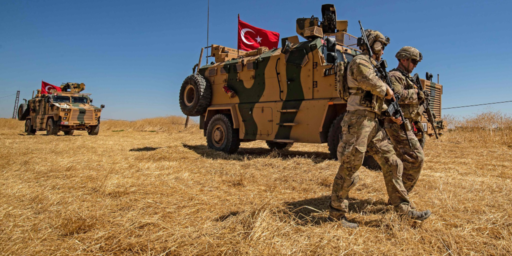Intervening In Syria Would Be Suicidal
President Obama is keeping the conflict in Syria at arms length. That's a good idea.
Jackson Diehl thinks failing to intervene in Syria may be Barack Obama’s biggest foreign policy failure:
The president’s handling of Syria, on the other hand, exemplifies every weakness in his foreign policy — from his excessive faith in “engaging” troublesome foreign leaders to his insistence on multilateralism as an end in itself to his self-defeating caution in asserting American power.
The result is not a painful but isolated setback, but an emerging strategic disaster: a war in the heart of the Middle East that is steadily spilling over to vital U.S. allies, such as Turkey and Jordan, and to volatile neighbors, such as Iraq and Lebanon. Al-Qaeda is far more active in Syria than it is in Libya — while more liberal and secular forces are turning against the United States because of its failure to help them. More than 30,000 people — most of them civilians — have been killed, and the toll mounts by the hundreds every day.
Of course, Obama is not solely responsible for this mess. But his serial miscalculations have had the consistent if unintended effect of enabling Syria’s Bashar al-Assad — first to avoid international isolation, then to go on slaughtering his own population with impunity.
(…)
For the past three months, Obama’s policy has become a negative: He is simply opposed to any use of U.S. power. Fixed on his campaign slogan that “the tide of war is receding” in the Middle East, Obama claims that intervention would only make the conflict worse — and then watches as it spreads to NATO ally Turkey and draws in hundreds of al-Qaeda fighters.
No doubt it’s easier for Romney and the Republicans to talk about the death of an ambassador in a terrorist attack than to ask war-weary Americans to think about this. But it is Syria that is Obama’s greatest failure; it will haunt whomever occupies the Oval Office next year.
There’s no doubt that the situation in Syria is serious. Not only has the civil war been devastating for tens of thousands of Syrian civilians, it has increased tensions between Syria and its neighbors, most especially Turkey, and has tended to sour the relationship between the West and Russia. It has revealed a rift between the United States and Iraq as the Iraqis have freely allowed Iran to use its airspace to transport weapons, material, and personnel. And, perhaps most ominously, it has created another opening for radical Islamists, many of them from far outside Syria to slip in under the guise of helping the rebellion while they develop plans of their own for a post-Assad Syria that could be even more dangerous than what we’re dealing with today. I don’t think there’s anyone who denies any of these facts.
What Diehl doesn’t address, though, are the potential consequences of intervention by the U.S. and the West into a situation that is already fraught with danger. Much as with the Iraq War, which Diehl was a huge supporter of, the sight of American troops in yet another Arab nation are just as likely to inflame the passions of our detractors in the region as they are anything else. When the inevitable civilian deaths at the hands of American troops come, those passions will become even more inflamed. Furthermore, the Syrians have already threatened to use chemical weapons against any outside forces that invade the country and, while doing that against American troops would likely be suicidal for the regime, it could inflict a heavy cost on a military that has already paid a heavy price over the past decade. At the point which the regime does fall, we would find ourselves responsible for the future of Syria, just as we were in Iraq. Inevitably, we would likely find ourselves the targets of the various factions that made up the Syrian rebels and the ethnic groups that make up Syria. A commitment to the future of Syria by U.S. military forces would likely be as long an endeavor as the Iraq War was, and just as costly.
Moreover, as Daniel Larison points out, such an intervention would be political suicide:
According to a recent Turkish opinion survey, 58% of Turks are opposed to war with Syria even as part of a NATO operation. For their part, NATO members want no part of a Syrian war, and opposition within Turkey to a unilateral Turkish war against Syria is even higher (76%). Diehl is calling for the U.S. to wage a war that the most important allied government in the area could not help wage without committing political suicide at home. So neither Turkey nor NATO would be in a position to support U.S. action if it were to happen.
Even more than in Libya, the U.S. would be acting virtually alone in Syria if it intervened.Regional opinion would be strongly against such action, and so would American public opinion. It would be the height of political folly for any administration to lead a military intervention in Syria, and it would also be the wrong policy for the U.S., its allies and clients, and Syria. Opting not to drag the U.S. into another unnecessary war can hardly be called a failure.
I’ve criticized Barack Obama for many things, and I opposed his decision to intervene in the Libyan Civil War, but I must say that his decision to be cautious when it comes to Syria is the right way to go. This is not a fight we need to be involved in.






If I recall correctly, he was cautious about getting involved in Libya as well.
@OzarkHillbilly:
Not cautious enough
@Doug Mataconis:
That is a matter of opinion, and one I largely agree with. However, if McCain and the neocons had had their way, not only would we have been involved a whole lot sooner, there would have been none of this “leading from behind” and I would give 10-1 odds that within 2 weeks there would have been some serious “boots on the ground.”
I was highly leery of intervening in Libya, for the main reason that once we started supporting the rebels in any way, we were committed to kicking out Ghaddaffi. There could have been no “pulling back” with him still in power; he would have slaughtered every person in every rebel town, and we would have had some of that blood on our hands. Thankfully, the rebels did take him down, and reasonably quickly.
The exact same situation applies in Syria – if we provide any overt support for the rebels, we are irrevocably invested in seeing them win & Assad gone. I don’t believe the people demanding our involvement there have put any serious thought into just how big (and bloody) a commitment that could turn out to be, especially if Russia keeps sending support to the regime.
Not to harp on the same tired point, but I had no great worry about Libya because of the map. Big empty country, desert terrain, few roads, air bases within range and no worries about stationing carriers nearby = perfect terrain for war from the air. The easiest kind of military problem to solve.
Now look at Syria: Big cities, big population, mountains, air bases twice as far away, carriers positioned off Lebanon. That’s just for starters. Throw in Hezbollah, the Kurds, the fact that we’d be stepping into a millenium-old religious war between Sunni and Shia, the fact that there’s a vulnerable minority population.
The difference between NATO-style air war and actual invasion is gigantic. The difference in threats – immediate and blowback – are infinitely greater in Syria. On a scale of difficulty, Libya was a 1. Syria’s a 5. Iran would be an 8. And the neo-cons want us to do Syria and Iran. These people are mentally unbalanced, and they will be running Mitt Romney’s foreign policy.
@michael reynolds:
13 for really bad juju.
@OzarkHillbilly: You can’t really tell, but I hit the “delete” button the 8. Attacking Iran would be a 13.
I trust that Jackson Diehl, since he is so eager for the US to get involved in Syria, is perfectly willing to argue for higher taxes to pay for such an undertaking and is willing to sign up to fight for said war.
If he isn’t, this is yet another case of “wishing something would happen that other people would pay for.”
Syria The Truth is addressed to the english or non arabic speaking individuals to show and explore the truth about the Syrian conflict. Away from the lies, manipulated, fabricated and deformed media . In “Syria The Truth” you will read articles or see some video clips that will never be published or reported on major western media companies. Just follow us in the below mentioned links, like our page on Facebook in order to receive all the Truth updates.
website: https://syriathetruth.wordpress.com
Facebook: http://www.facebook.com/syttruth
Twitter: https://twitter.com/SyriaTheTruth
Syria is a real dilemma: go in and who do you support? Stay out and innocent people continue to be killed. If I was Obama, I would bring Henry Kissinger on as a special Middle East adviser.
Yes, innocent people will die. They die in wars all the time. They die in famines because of poor or non-existent governance. And it sucks. But it is not our duty to go ’round the world fixing every damn problem. Especially when that problem is to be “fixed” via the use of the United States armed forces.
What I said for Libya goes double (5x?) for Syria. This is not our business, it’s stupid, and it sets yet another precedent in a long line of bad ones. No, no, no.
Also: even if you actually are a neocon, what the hell? The neocons want war with Iran. Getting involved in Syria hampers our ability to do that, right? Do any of these people actually think anything through? Arg.
@Clanton: “Syria is a real dilemma: go in and who do you support? Stay out and innocent people continue to be killed. If I was Obama, I would bring Henry Kissinger on as a special Middle East adviser. ”
Good idea, because Kissinger never hesitated when it came to killing people. True, his brilliant plan to escalate the Vietnam war by bombing Cambodia led to the coup and dictatorship of Pol Pot, and one of the most vile genocideal regimes in history. But heck, what are the odds he could cause that much evil to happen twice in one lifetime? Let’s give him a shot!
The time to get involved in Syria has long passed. There might have been international support for air strikes ala what was done in Libya, but, at this point, you have the Assad regime versus “protesters” who are increasingly backed by Salafist groups.
However, we might still get dragged in through NATO if the cross border attacks on Turkey continue.
As I argued last week:
covert help YES
overt help NO.
With covert help, Assad is gone within 18 months. The ensuing power vacuum is going to be Lebanon writ large. We are going to need chits.
But Michael Reynolds nails it: sending in Nato troops won’t help much, and will quickly become a quagmire.
@Rob in CT:
I hate to give cover to the Neocons, but Syria is a client state of Iran. Hence there is some logic to their point. War with Syria IS war with Iran… Kinda… Sorta…. Unfortunately for them, there are no easy wars in the ME.
@Clanton:
That’s a joke, right? Good post, Doug – I am totally in accord.